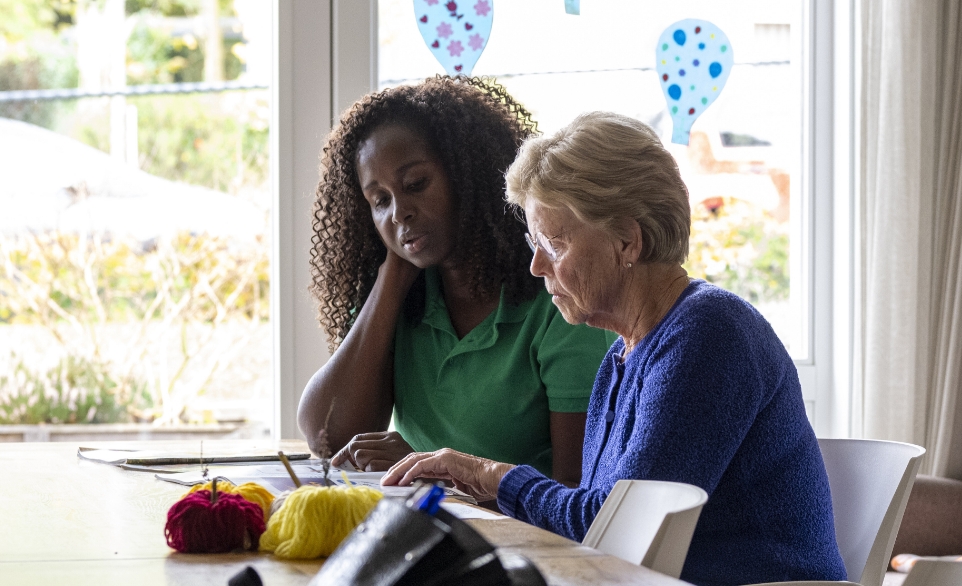
Because real care isn’t just about what you do — it’s about how you do it.
Care work moves fast.
There are calls to complete, medications to administer, notes to write, and time pressures that rarely let up.
But in the middle of all that busyness, one truth remains:
Compassion is the heartbeat of great care.
It’s not an “extra.” It’s not just a nice bonus when time allows.
Compassion is what transforms tasks into trust, routines into relationships, and support into something truly meaningful.
At Carer Academy by Big Sister, we believe every carer has the power to bring more compassion into every shift — no matter how busy or pressured the day feels.
In this blog, we’ll explore what compassionate care really looks like, why it matters more than ever, and how you can weave it into your everyday work in small but powerful ways.
What Is Compassionate Care?
Compassionate care is more than kindness. It’s the ability to understand what someone else is feeling and then act in a way that supports them with empathy, dignity, and respect.
It’s:
- Speaking with warmth
- Listening without rushing
- Being patient, even when you’re pressed for time
- Seeing the person behind the condition or care plan
- Creating little moments of human connection that say, “You matter.”
Why Compassion Changes Everything
Compassionate care doesn’t just make clients feel better — it improves outcomes.
Studies show that when people feel genuinely cared for, they:
- Feel less anxious and more in control
- Are more cooperative and trusting
- Report higher satisfaction with their care
- Experience better emotional and even physical health
And for carers, compassion:
- Increases job satisfaction
- Reduces burnout
- Strengthens relationships with clients and families
- Creates a more positive work environment
Compassion isn’t just emotional — it’s effective.
-
Start with Presence, Not Pressure
When you’re under pressure, it’s easy to become task-focused. But compassion begins with presence — being fully in the moment, even if that moment is brief.
Try this:
- Before entering a client’s home or room, pause and take one deep breath
- Remind yourself: “This person deserves my full attention, even for just a few minutes.”
- Make eye contact, say their name, and greet them like you’re glad to see them (because you are)
Those first few seconds set the tone — and can instantly help someone feel respected and valued.
-
Slow Down to Connect (Even Briefly)
You don’t need extra time to show compassion — just a shift in focus.
Instead of rushing through tasks, look for small moments to connect:
- A gentle hand on someone’s shoulder when they’re nervous
- A joke or memory that makes them smile
- Asking, “How are you feeling today — really?”
- Noticing their body language and checking in if something seems off
These moments don’t take long — but they leave a lasting impression.
-
Choose Words That Uplift
What we say — and how we say it — can either comfort or confuse, soothe or startle.
Compassionate communication means:
- Using a calm, kind tone, especially when someone is distressed
- Avoiding jargon — speak clearly and simply
- Replacing clinical phrases with gentle ones
- Try: “Let’s help you feel a bit more comfortable” instead of “Let’s get this over with”
- Try: “I’m here to support you” instead of “It’s on your care plan”
Words matter. They shape how people feel in your care.
-
Recognise and Honour Emotions
In care, you see a lot of emotion — fear, sadness, frustration, confusion. Sometimes it’s tempting to gloss over it so you can get on with the task.
But compassionate carers acknowledge emotions instead of avoiding them.
Try saying:
- “That sounds really difficult — would you like to talk about it?”
- “I can’t fix everything, but I’m here with you.”
- “You’re allowed to feel that way.”
You don’t need to solve everything. Just being a calm, steady presence can make someone feel less alone.
-
Be Compassionate to Your Colleagues Too
Compassion isn’t just for clients. Outstanding carers also show kindness to the people they work with.
That means:
- Noticing when a colleague is struggling and offering support
- Saying thank you — even for the small stuff
- Avoiding gossip or criticism behind backs
- Checking in with: “How are you holding up today?”
When your team is kind to each other, the whole atmosphere changes — and everyone benefits, including the people you care for.
-
Bring Compassion to Yourself
This is the one most carers skip. But it’s just as important.
Compassion isn’t something you can pour out endlessly without topping up. If you’re harsh, critical, or constantly exhausted — your ability to care with heart will fade.
So, practice:
- Speaking kindly to yourself after a hard shift
- Forgiving your mistakes and learning from them
- Asking for help when you need it
- Taking breaks, resting, and refuelling with intention
Compassion starts with you. Because you can’t give what you don’t have.
Every Shift Is an Opportunity
No matter how busy, emotional, or challenging the day — you have the power to bring compassion into it.
It might not feel big at the time:
- Holding someone’s hand during a tough moment
- Taking 10 extra seconds to help someone feel understood
- Choosing to respond with patience instead of frustration
But over time, these moments shape how people feel about their care — and how you feel about yourself as a carer.
Every moment matters. Every interaction is an opportunity to show someone: You’re not alone. You’re seen. You matter.
And that’s what truly exceptional care looks like.
Final Thought: You Don’t Need More Time — Just More Intention
Bringing compassion into your shift isn’t about working longer or doing more.
It’s about doing what you already do, but with care, connection, and presence.
At Carer Academy, we believe compassion is a skill — and like any skill, it can be practiced, strengthened, and celebrated.
So today, try one thing:
- Greet every client like you’re glad to see them
- Choose words that make someone feel safe
- Take one breath before each task
- Offer one kind word to a colleague — or yourself
These small acts ripple. They build trust. They build confidence. And they build the kind of care you can be proud of.
Want to develop your compassionate care skills?
Visit the Carer Academy section of the Big Sister website for quick videos, reflection tools, and mindset challenges that help you bring heart into every shift — even the hard ones.
Watch our Carer Academy Playlist on YouTube, and download the brochure, or book a call
Because when care is delivered with compassion, every moment truly matters.













